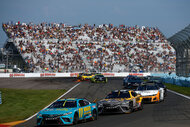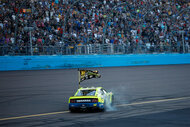What Are NASCAR Charters And The RTA — And What Do They Have to Do with The Future of The Sport?
Organized through the Race Team Alliance (RTA), which was formed in 2014 to provide teams a unified presence at the negotiating table, an RTA subcommittee that included 23XI Racing’s co-owner Curtis Polk, four-time Cup Series winner and vice chairman of Hendrick Motorsports Jeff Gordon, RFK Racing president Steve Newmark, and Joe Gibbs Racing’s president Dave Alpern met last weekend to discuss recent issues.
Ahead of the Cup Series cruising into the Las Vegas Motor Speedway for the South Point 400 this weekend, some of NASCAR’s most high-profile teams are gassed up and redlining over the league’s current revenue model, which they feel has no chance of providing long-term stability to the sport.
Organized through the Race Team Alliance (RTA), which was formed in 2014 to provide teams a unified presence at the negotiating table, an RTA subcommittee that included 23XI Racing’s co-owner Curtis Polk, four-time Cup Series winner and vice chairman of Hendrick Motorsports Jeff Gordon, RFK Racing president Steve Newmark, and Joe Gibbs Racing’s president Dave Alpern met last weekend in a Charlotte hotel to air their grievances and discuss what’s at stake. For Polk, who’s spearheading the charge for change, enough’s enough.
“The economic model is really broken for the teams,” Polk revealed. “We’ve gotten to the point where teams realize the sustainability in the sport is not very long term. This is not a fair system.”
A legendary fixture in the sport now for three decades, “Wonderboy” Gordon echoed Polk’s sentiment at the meeting that changes must come or else the league will suffer.
“I have a lot of fears that sustainability is going to be a real challenge,” Gordon told reporters.
Polk has been spearheading the negotiations with NASCAR on behalf of the RTA, and in June, he and the RTA constructed a seven-point plan in the hope of creating a new revenue sharing model that would be both fair and favorable for teams. According to Polk, that proposal did little more than collect dust until NASCAR countered RTA’s demands last week, adding incremental revenue increases while emphasizing cutting costs. Still, a significant area that was not addressed is the question of cutting costs with layoffs — a contentious tenet that has recently exploded into the public sphere this season with only four races left before a Cup Series champion is crowned.
The battle over cost-cutting schemes and poorly devised incentives is not a new problem for NASCAR. In an attempt to keep the wheels on the track, the league adopted a charter system in 2016 as a way to at least provide teams with something of monetary value and a way to protect their investment. Though it somewhat resembles a franchise model, it never really will be because NASCAR has been independently owned since Bill France founded it in 1948. The France family has been running the league ever since.
RELATED: What's NASCAR's History In California Wine Country?
Currently, there are 36 charters in a field of 40 cars that compete in the Cup Series, and every charter owner receives a fraction of the purse for each Cup Series points race. The positive is that Cup Series team charter values have skyrocketed from $6 million to $12 million in the past year thanks, in part, to the cost-cutting Next Gen car and an increased demand in audience viewership. On the flip side, there’s a lot of pressure riding on each charter because NASCAR retains the right to remove a charter if a team places in the bottom three spots of the owner standings for three years in a row.
As presently constructed, nearly all the onus is on the teams, not NASCAR itself, because the teams must go out and independently secure sponsorships. This is no easy task, and considering sponsors' capital infusions comprise of 60% to 80% for the charters’ budgets, locking in sponsorship deals is absolutely critical to teams’ financial vitality. When there’s not enough to go around, this puts cash-strapped teams in the difficult position of trying to find relief elsewhere and is the reason the RTA subcommittee, according to Newmark, asked NASCAR for “distribution from the league to cover baseline costs.”
That’s only the tip of the iceberg. Though TV revenue is split between NASCAR, teams, and tracks, Polk revealed that, unlike Formula 1, whose revenue is split fifty-fifty between teams and the overall league owners, in NASCAR, 93% goes to the France family — who also own 11 tracks on the 2023 Cup Series schedule — while teams are left scrounging for breadcrumbs that amount to a measly 7%, he said.
“We have become full-time fundraisers,” Alpern declared. “Instead of working on our business, we’re raising money just to exist.”
With the current charter agreement expiring simultaneously with NASCAR’s current television deals at the end of the 2024 season, those like Alpern and Polk who are representing the RTA are pressuring the league to act.
“NASCAR is a money-printing machine,” Polk said. “But the teams and the drivers are the ones putting on the show.”
In addition to revenue sharing problems, NASCAR still has its hands full with safety issues from the ever-controversial Next Gen car. Despite NASCAR president Steve Phelps acknowledging the league’s poor communication efforts around the subject, the most popular driver in the sport Chase Elliott has now joined a growing group of angry drivers who are tired of seeing their peers crash more because of the car, or worse, be injured from its design flaws.
“These types of incidents that result in injuries… I’m not a doctor, but I’ve watched a lot of cars back into the wall and the guy would be fine,” Elliott expressed at Talladega’s qualifiers. “It could be me next week.”
“Heck, we had plenty of time to test this car and crash it, do all the things that we need to do to ensure that some of these things that are happening now weren’t happening,” Elliott continued. “We had a ton of time to do that, and this car was delayed an entire calendar year on top of that. We got an extra year of time to work on it, and we’re still in this position.”
You can watch "Race for the Championship" on USA Network every Thursday at 10/9c. You can also watch more NASCAR content on Peacock now.

















